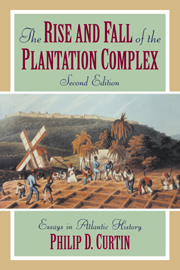Book contents
- Frontmatter
- Contents
- Preface
- Preface to first edition
- Beginnings
- 1 The Mediterranean origins
- 2 Sugar planting: from Cyprus to the Atlantic islands
- 3 Africa and the slave trade
- 4 Capitalism, feudalism, and sugar planting in Brazil
- 5 Bureaucrats and free lances in Spanish America
- Seventeenth-century transition
- Apogee and revolution
- Aftermath
- Appendix
- Index
3 - Africa and the slave trade
Published online by Cambridge University Press: 05 June 2012
- Frontmatter
- Contents
- Preface
- Preface to first edition
- Beginnings
- 1 The Mediterranean origins
- 2 Sugar planting: from Cyprus to the Atlantic islands
- 3 Africa and the slave trade
- 4 Capitalism, feudalism, and sugar planting in Brazil
- 5 Bureaucrats and free lances in Spanish America
- Seventeenth-century transition
- Apogee and revolution
- Aftermath
- Appendix
- Index
Summary
Africa and African history have a peculiar place in Western historical writing and in Western consciousness. Some of it has to do with the special relationships between Africa and Western civilization over the past 400 or 500 years, and especially with the fact that Africans were the principal slaves in the Western-controlled world from the sixteenth century well into the nineteenth. But that was not always so. The prototypical slaves in the medieval world were Slavs – the people exported from the Black Sea slave trading posts. In classical Latin, the word for “slave” was manicipium, but the predominance of Slavic people in the medieval trade added a new term, sclavus. This word and its successors, like “slave,” have been the dominant terms for people owned by other people in most European languages ever since.
People of African descent were nevertheless the stereotypical slaves in Western societies from the sixteenth century to the nineteenth, and this fact of history was one source of Western suppositions about alleged African racial inferiority. And Africa's exceptional place in Western thought continued well into the twentieth century. Africa was the last of the inhabited continents to have its history included in the curricula of European and American universities.
African isolation
The peculiarity of African–Western relations goes back even further. Sub-Saharan West Africa was close to the Mediterranean world but was comparatively unknown. It had had some contact with the Mediterranean civilizations as far back as the first millennium B.C. – 800 to 1000 B.C.
- Type
- Chapter
- Information
- The Rise and Fall of the Plantation ComplexEssays in Atlantic History, pp. 29 - 45Publisher: Cambridge University PressPrint publication year: 1998

